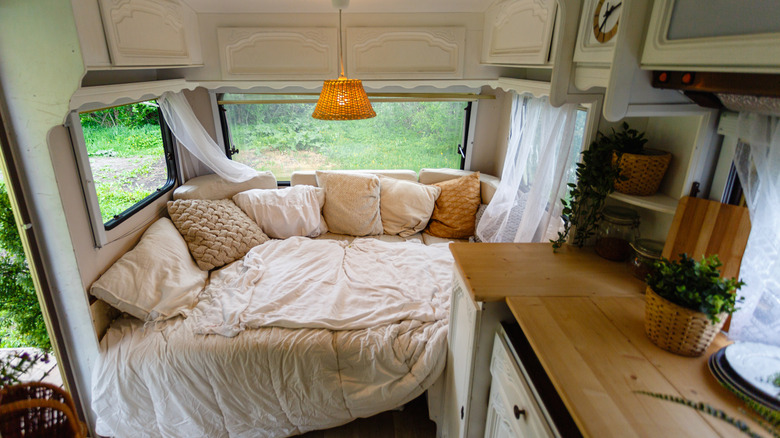The Simple Trick For Keeping Your RV Warm On Cold Nights
Cooler temperatures are proven to be beneficial for your sleep, but there's nothing that makes us more miserable than waking up shivering with cold toes and fingers. To that, we say, "No, thank you!" While camping is not always meant to be super comfortable, you definitely shouldn't have to suffer through any extreme temperatures. However, the solution is not necessarily purchasing expensive RV skirting, which is designed to prevent cold air from creeping into your RV. The trick to staying warm is closer to hand than you might think, and it will help you when planning a successful RV trip.
Bubble wrap is both inexpensive and a super effective insulator that can keep small spaces like your RV or camper van warm on those chilly nights. The reason it works is simple. Just like insulation with its countless tiny air pockets, the little bubbles of air inside the bubble wrap can trap warm air inside your vehicle and reflect it back into your space while also keeping the cool temperatures out. As Sancell, an Australian protective packaging manufacturer, points out, the thicker the bubble wrap, the better the insulation.
Other ways to keep warm in a pinch
It seems like there's a subreddit for everything and of course, there's also one for RV owners: r/RVliving. These users have an answer to any issue you might have, whether you're a weekend warrior or living out of your camper. This includes the best ways to affordably insulate your RV.
In the best ways to insulate for cheap thread, several users recommend purchasing some foil-backed foam board that you can tape up around the bottom of your camper. While it won't look great, it will keep cool air from seeping in under your RV and making it cooler inside. You could also stuff some hay bales around the perimeter of your camper, which is just as cheap and has the same effect.
Other users also recommend placing insulating foam in the vent covers, which are known to leak out warm air. However, as user proost1 warns, if campers don't regularly ventilate their RV, the condensation that builds up can lead to mold and water damage. So, as long as it's not blizzarding outside, open the vents and doors during the day to let things dry out.

